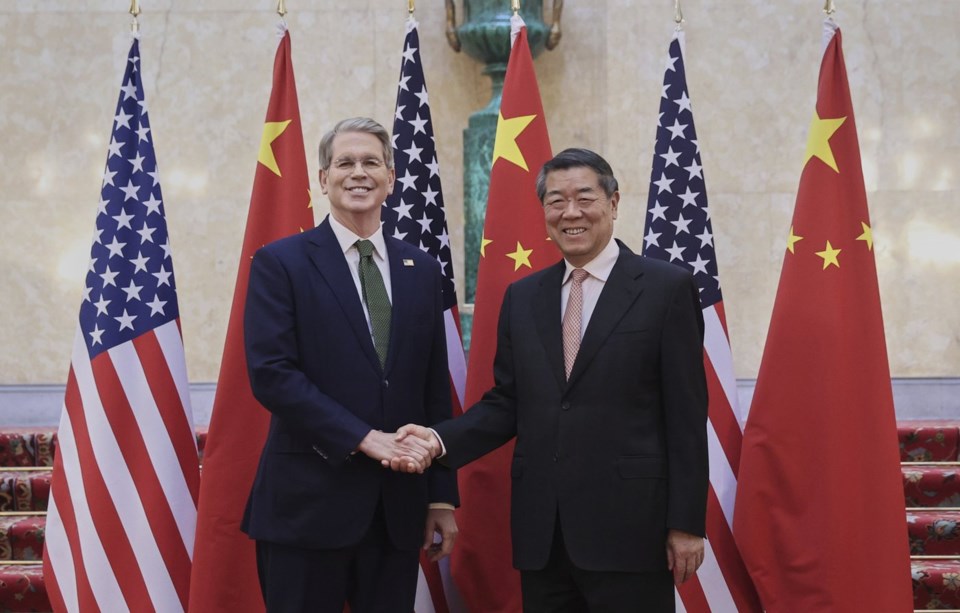BANGKOK (AP) â Washington and Beijing have signed a trade agreement that will make it easier for American firms to obtain magnets and from China that are critical to manufacturing and microchip production, U.S. Treasury Secretary Scott Bessent said Friday.
The agreement comes after China retaliated against imposed by the Trump administration on Chinese goods and moved to slow export of rare earth minerals and magnets much-needed by U.S. industrial interests.
Bessent said on Fox Business Networkâs âMornings with Mariaâ that Trump and Chinese President Xi Jinping âhad a phone callâ previously "and then our teams met in London, ironed this out, and I am confident now that we, as agreed, the magnets will flow.â
âPart of the agreement was tariffs coming down and rare earth magnets starting to flow back to the U.S.," Bessent said. "They formed the core of a lot of our industrial base. They were not flowing as fast as previously agreed.â
His comments follow President Donald Trump announcing an agreement with China that he said would ease exportation of magnets and rare earth minerals
That pact cleared the way for the trade talks to continue. The U.S. has previously suspended some sales to China of critical U.S. technologies like components used for jet engines and semiconductors. It has also agreed to stop trying to revoke visas of .
Bessent added of critical mineral exports: âWhat weâre seeing here is a de-escalation.â
Commerce Secretary Howard Lutnick told Bloomberg TV that the deal was signed earlier this week.
Chinaâs Commerce Ministry said Friday that the two sides had âfurther confirmed the details of the framework,â when responding to a question about if China was to speed up exports of rare earths to the U.S. and if the U.S. was to remove some restrictions on China.
âChina will, in accordance with the law, review and approve eligible export applications for controlled items. In turn, the United States will lift a series of restrictive measures it had imposed on China,â the ministry said.
Initial talks in Geneva in early May led both sides to postpone massive that were threatening to freeze much trade between the two countries. Later set a framework for negotiations and the deal mentioned by Trump appeared to formalize that agreement â setting the stage for Bessent's comments on Friday.
In London, export controls of the minerals eclipsed tariffs in the trade negotiations after China in April imposed permitting requirements on seven rare earth elements, per a Chinese law that applies to all exports, not just those bound for the U.S. market.
With the permitting process taking 45 days, the new requirement has caused a pause in shipments, threatening to disrupt production of cars, robots, wind turbines and other high-tech products in the U.S. and around the world. The U.S., meanwhile, took restrictive measures on exports of high tech to China.
By the latest agreement, China does not remove the permitting requirement on rare earths but retains the flexibility to dial up or down the approval process as needed.
Sun Yun, director of the China program at the Washington-based think tank Stimson Center, said Beijing has only tightened its overall policy on rare earths but has the discretion on how to implement it. "Thatâs the Chinese style,â she said. âIf all goes well, permit happens. If things go in a wrong direction, like U.S. arms sales to Taiwan, permits gone with wind.â
China also has taken steps recently on , announcing last week that it would designate two more substances as precursor chemicals for fentanyl, making them subject to production, transport and export regulations. Trump has demanded that Beijing do more to stop the flow of such precursor ingredients to Mexican drug cartels, which use them to make fentanyl for sale in the U.S. He imposed 20% tariffs on Chinese imports over the fentanyl issue, the biggest part of current 30% across-the-board taxes on Chinese goods.
The agreement struck in May in Geneva called for both sides to scale back imposed as Trump escalated his trade war and sharply raised import duties. Some higher tariffs, such as those imposed by Washington related to the trade in fentanyl and duties on aluminum and steel, remain in place.
The rapidly shifting policies are taking a toll on both of the world's two largest economies.
The annual pace from January through March, partly because imports surged as companies and households rushed to buy foreign goods before Trump could .
In China, factory profits sank more than 9% from a year earlier in May, with automakers suffering a large share of that drop. They fell more than 1% year-on-year in January-May.
Trump and other U.S. officials have indicated they expect to reach trade deals with many other countries, including India.
âWe're going to have deal after deal after deal,â Lutnick said.
___ Weissert reported from Washington. Associated Press writer Didi Tang contributed from Washington.
Elaine Kurtenbach And Will Weissert, The Associated Press



